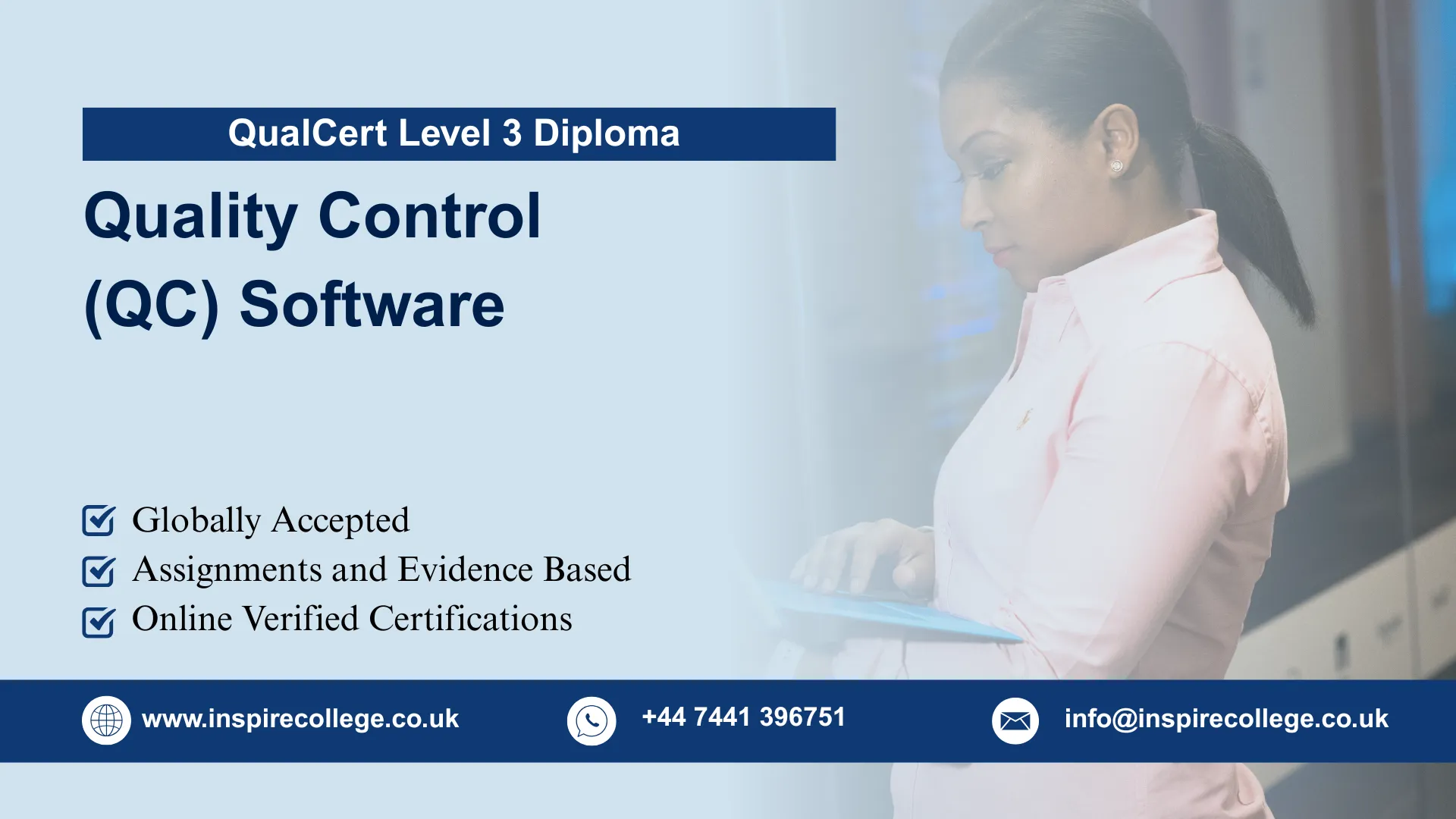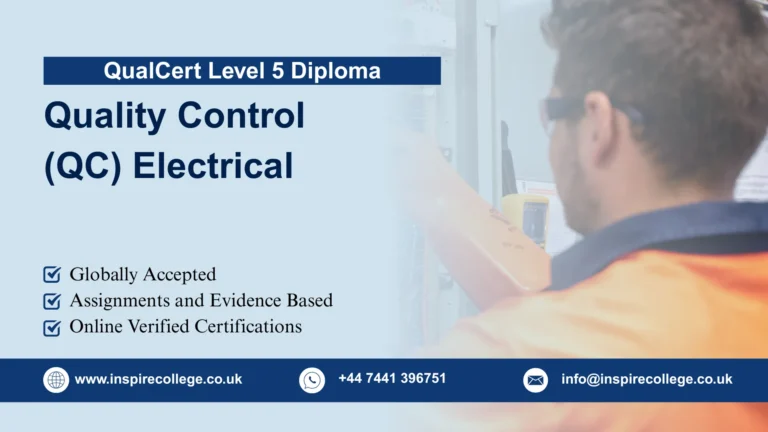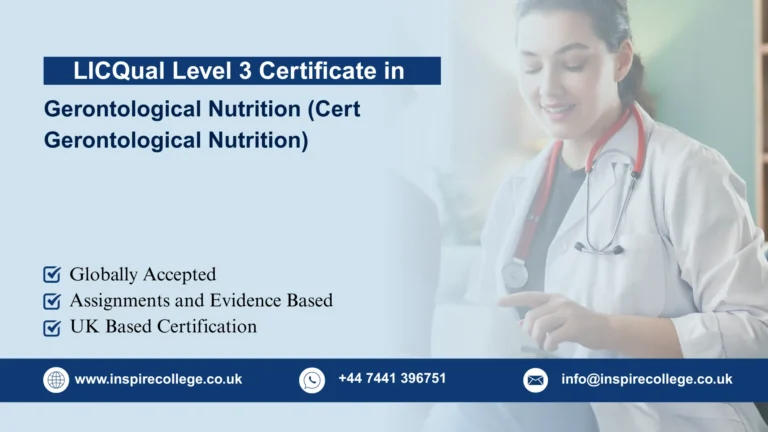
QualCert Level 3 Diploma in Quality Control (QC) Software
In today’s fast-paced digital world, ensuring the reliability, functionality, and performance of software is more critical than ever. Organizations across industries depend on robust quality control systems to deliver software that meets customer expectations, complies with industry standards, and supports business growth. The QualCert Level 3 Diploma in Quality Control (QC) Software is designed to provide learners with a strong foundation in software quality assurance, testing techniques, and process improvement, preparing them for rewarding careers in this rapidly growing field.
QualCert Level 3 Diploma in Quality Control (QC) Software introduces learners to the essential principles and practices of software quality control, focusing on practical applications that are directly relevant to workplace environments. Throughout the course, learners will develop knowledge of testing methodologies, error detection, compliance requirements, and quality monitoring tools. By combining theory with hands-on learning, the program ensures that graduates can effectively apply quality control strategies to real-world projects.
The QualCert Level 3 Diploma in QC Software equips participants with critical skills such as identifying and addressing software defects, implementing structured testing processes, and supporting organizational quality objectives. These competencies not only enhance employability but also serve as a stepping stone for further academic progression or advanced professional qualifications in software quality management.
Whether you are an aspiring IT professional, a graduate seeking specialization, or a working individual aiming to expand your expertise, this diploma offers the perfect pathway to build a successful career in software quality assurance and control.
To enroll in the QualCert Level 3 Diploma in Quality Control (QC) Software, candidates must meet the following entry requirements:
- Educational Background
- A minimum of a high school diploma or equivalent qualification is required.
- A background in computing, information technology, or related fields is beneficial but not mandatory.
- The course is open to learners from diverse educational pathways, making it accessible for beginners as well as those with prior knowledge.
- Professional Experience
- No prior experience in software development or quality assurance is required.
- A basic understanding of software principles, programming concepts, or the software lifecycle will be advantageous.
- An interest in software quality control practices will help learners engage more effectively with the course.
- Technical Skills
- Candidates must demonstrate basic computer literacy.
- Proficiency in standard office software such as word processors, spreadsheets, and presentation tools is required.
- Familiarity with software testing tools and platforms is useful but not essential, as these skills will be developed during the course.
- Language Proficiency
- Proficiency in English is necessary to study the course effectively.
- Non-native English speakers may be asked to provide evidence of English language skills through a recognized qualification, test, or previous study in English.
- Motivation and Commitment
- Candidates should show a strong interest in software quality control and assurance.
- A commitment to completing all course requirements, including theory and practical activities, is essential.
- A desire to progress in the field of quality assurance will support long-term career development.
Mandatory Units
The QualCert Level 3 Diploma in Quality Control (QC) Software comprises several study units:.
- Advanced QC Software Features
- Quality Performance Indicators and KPIs
- Root Cause Analysis Using QC Software
- Integration of QC Software with ERP Systems
- Global QC Standards and Compliance
- Continuous Improvement through QC Analysis
In the evolving world of software development, advanced quality control (QC) practices are essential to ensure reliability, compliance, and continuous improvement. The QualCert Level 3 Diploma in Quality Control (QC) Software introduces learners to a wide range of advanced tools, methodologies, and global standards that shape modern quality assurance processes.
Advanced QC Software Features and Applications
- Analyzing Advanced Features of QC Software
- Gain in-depth knowledge of the latest functionalities available in quality control software.
- Learn how to utilize these features to enhance accuracy, efficiency, and overall software performance.
- Explore industry-specific tools designed to meet the demands of modern quality management.
- Configuration and Customization
- Configure QC software settings to suit organizational needs and industry standards.
- Customize workflows, templates, and testing parameters for more efficient quality assurance.
- Adapt the software to handle specialized testing requirements across diverse sectors.
- Automation of Quality Control Processes
- Implement automated workflows to streamline repetitive testing and validation tasks.
- Reduce human error by using software-driven quality checks and validations.
- Improve testing efficiency while saving time and resources through automation.
- Data Analytics and Reporting Tools
- Leverage integrated analytics to identify trends in software performance and reliability.
- Generate real-time reports and visual dashboards for effective decision-making.
- Use data-driven insights to implement proactive quality improvements.
Quality Performance Indicators (KPIs)
- Identifying Relevant KPIs
- Understand and select the most important KPIs for software quality control.
- Focus on indicators related to functionality, usability, and reliability.
- Developing Metrics for Measurement
- Establish measurable metrics to evaluate software performance and user satisfaction.
- Create benchmarks that align with organizational quality standards.
- Interpreting and Applying KPI Data
- Analyze KPI outcomes to identify strengths and weaknesses in the testing process.
- Implement corrective measures to address performance gaps.
- Using Dashboards and Reporting Systems
- Utilize visual dashboards to track progress and share insights with stakeholders.
- Communicate quality results effectively across teams and management.
Root Cause Analysis Using QC Software
- Applying Structured Methodologies
- Learn methods such as the “5 Whys” and Fishbone Diagrams for problem-solving.
- Apply structured frameworks to identify the root causes of software defects.
- Data-Driven Analysis
- Use QC software tools to collect and analyze defect-related data.
- Differentiate between recurring and isolated quality issues.
- Corrective and Preventive Actions
- Develop practical solutions to prevent defects from reoccurring.
- Implement preventive measures to improve long-term quality.
- Monitoring Effectiveness
- Track the results of corrective actions using QC monitoring systems.
- Ensure that implemented solutions produce measurable improvements.
Integration of QC Software with ERP Systems
- Understanding ERP’s Role in Quality Management
- Explore how ERP platforms support enterprise-wide quality processes.
- Recognize the benefits of connecting QC software with ERP solutions.
- Configuring for Integration
- Set up QC systems to synchronize with ERP platforms for seamless data flow.
- Ensure compatibility for efficient workflow execution.
- Automated Workflows
- Create automated processes that link quality assurance with ERP operations.
- Streamline tasks such as defect reporting, compliance checks, and documentation.
- Impact Analysis
- Evaluate how integration enhances efficiency, accuracy, and compliance.
- Demonstrate the organizational value of unified QC and ERP systems.
Global QC Standards and Compliance
- Identifying International Standards
- Learn about ISO, IEEE, and other globally recognized quality frameworks.
- Understand how these standards apply specifically to software quality.
- Aligning Testing Processes
- Ensure that software validation and testing align with international regulations.
- Apply industry best practices for global compliance.
- Conducting Audits and Compliance Checks
- Use QC tools to perform audits and ensure adherence to global standards.
- Identify gaps and implement corrective strategies.
- Maintaining Compliance
- Adopt practices that ensure long-term regulatory alignment.
- Keep software systems updated to meet evolving quality requirements.
Continuous Improvement through QC Analysis
- Applying Continuous Improvement Frameworks
- Integrate Six Sigma, Lean, and other methodologies into software quality control.
- Use structured approaches for identifying inefficiencies.
- Using QC Data for Process Enhancement
- Collect and analyze performance data to drive continuous improvement.
- Identify opportunities for innovation and refinement.
- Developing Long-Term Strategies
- Formulate strategies for ongoing quality monitoring and optimization.
- Build sustainable improvement cycles within the organization.
- Fostering a Culture of Quality
- Encourage teamwork, accountability, and shared responsibility for quality.
- Promote a proactive approach to continuous improvement across software teams.
The QualCert Level 3 Diploma in Quality Control (QC) Software is designed to cater to a wide audience of learners who want to build or strengthen their knowledge in software quality assurance and testing. This program is suitable for:
- Aspiring Quality Control Professionals
- Individuals aiming to begin a career in software quality control and assurance.
- The course provides essential foundations in QC methodologies, testing strategies, and compliance frameworks.
- Learners gain practical skills to confidently enter the quality assurance profession.
- Current Software Testers and QA Analysts
- Professionals already employed in testing or quality assurance roles.
- This diploma allows them to formalize their existing knowledge and strengthen their expertise.
- It supports career advancement by enhancing technical proficiency and understanding of modern QC practices.
- Software Developers
- Developers who want to complement their programming expertise with quality assurance knowledge.
- The course equips them to collaborate effectively with QC teams during development cycles.
- They gain the ability to integrate quality control principles into their own coding practices, resulting in higher-quality outputs.
- IT Professionals
- Those working in IT roles who wish to expand into the specialized field of quality control.
- Learners develop a comprehensive understanding of QC methodologies, software testing, and defect management.
- This added expertise can improve career flexibility and open new opportunities within IT and QA sectors.
- Project Managers and Team Leads
- Leaders responsible for managing software development or IT projects.
- The diploma provides them with a solid understanding of quality control standards and processes.
- This knowledge enables them to implement effective QC systems, monitor progress, and ensure project success.
- Recent Graduates
- Graduates from computer science, IT, engineering, or related fields seeking to specialize in software quality control.
- The diploma serves as a strong entry point into the profession by combining theory with practical applications.
- It also enhances employability and career readiness in the competitive software industry.
- Career Changers
- Individuals from non-IT backgrounds who want to transition into software quality assurance.
- The course provides them with the knowledge, skills, and confidence to make a smooth and successful career switch.
- It emphasizes both the practical and theoretical aspects required to excel in QC roles.
Register Now
QualCert Level 3 Diploma in Quality Control (QC) Software






